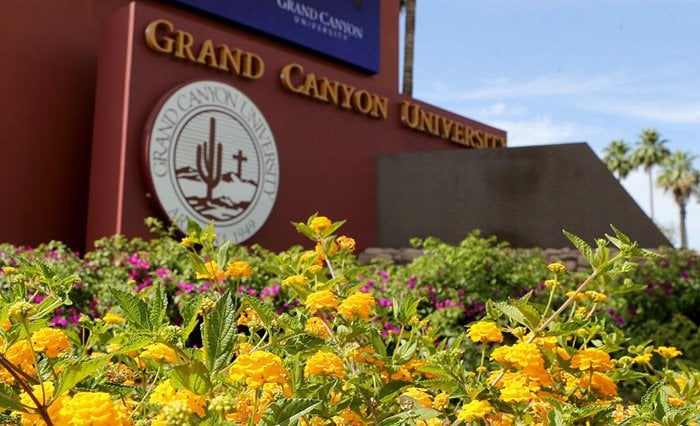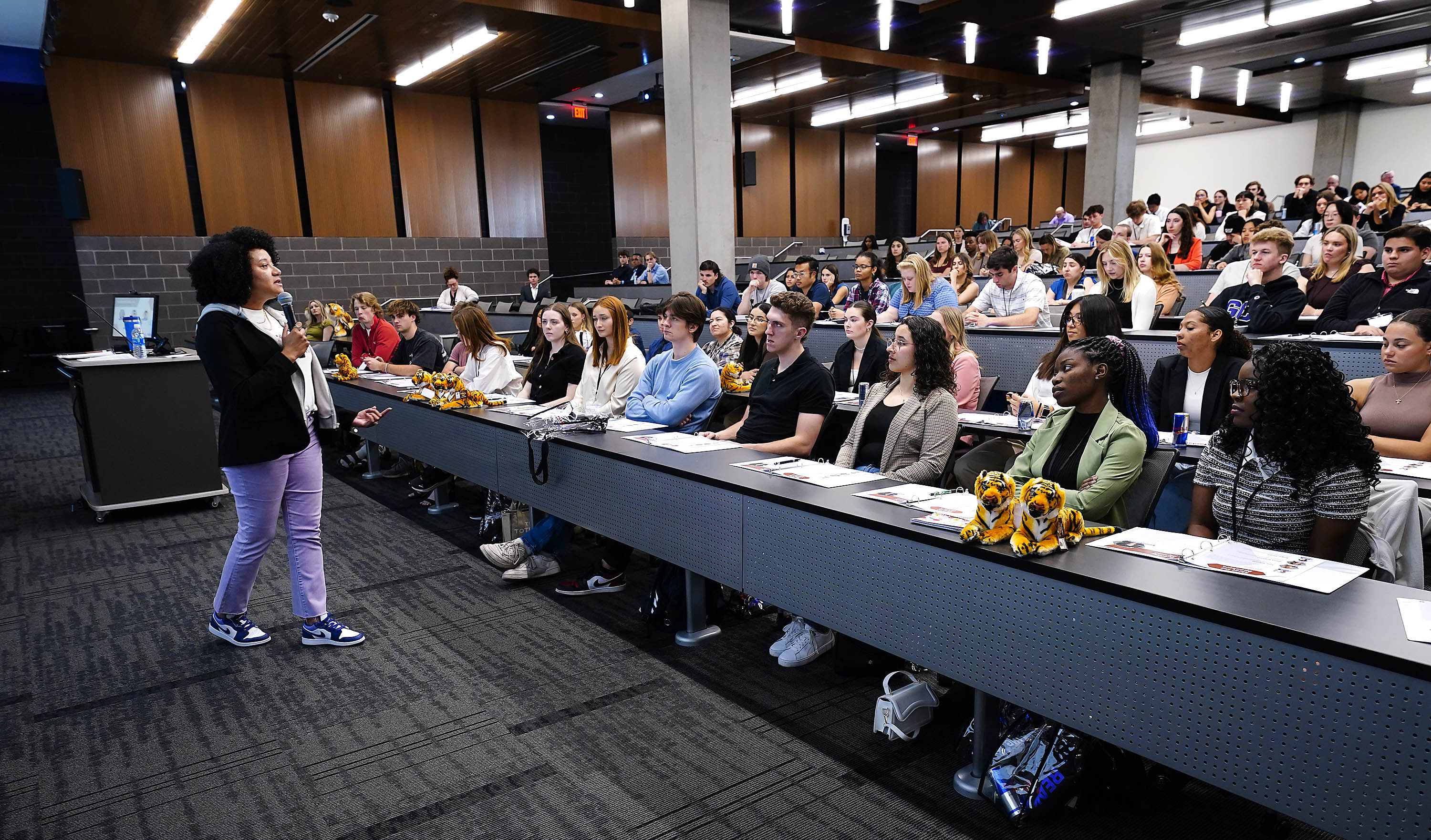
Grand Canyon University categorically denies every accusation in the Department of Education’s statement and will take all measures necessary to defend itself from these false accusations.
The Department’s decision to fine Grand Canyon University $37.7 million and impose conditions on its program participation agreement confirms what we previously outlined in this detailed statement and is further evidence of the coordinated and unjust actions the federal government is taking against the largest Christian university in the country.
The Department’s actions today are not validated by either the federal court system, which has already ruled in GCU’s favor in a similar matter at both the district and appellate court levels in Young v GCU, or other regulatory agencies that spend many days on our campus reviewing the robust and transparent disclosures the University provides its students. Specific to the Young case, the courts rejected the claim that GCU’s disclosures of doctoral program requirements misrepresented the time or cost it would take a student to complete a doctoral program, and it found the net impression of GCU’s many disclosures make clear the cost to complete the program. Contrary to the Department’s assertion that these are “fine print” disclosures, GCU makes clear in the most prominent place it provides financial disclosures for academic programs – its Degree Program Calculator (see pdf image in original statement) – that there can be continuation courses, and the costs associated with those, in doctoral programs in order to complete the dissertation process. GCU’s disclosure is in full-size red type and placed above the Degree Program Calculator calculation in order to bring attention to it. Continuation courses are common in higher education doctoral programs in addition to the total cost of the required 60 credits. In fact, we believe our disclosures related to continuation courses are more extensive than other universities, yet only GCU is being targeted by the Department.
As just one example of other regulatory bodies’ assessments of GCU, in contrast to what the Department is alleging: GCU’s accreditor, the Higher Learning Commission, stated the following after its comprehensive review of GCU in 2021:
• “Their recruitment and marketing materials are clear and transparent, and financial information presented to students throughout the student lifecycle is robust.”
• Specific to a prospective doctoral student’s experience, HLC stated: “The information and resources provided are robust and thorough, providing prospective students a clear picture of their academic and financial path toward a degree at GCU.”
GCU tried to work cooperatively with the Department to address this difference of opinion that could have easily been resolved in a 10-minute phone call had the Department been open to such a resolution. In fact, given the Department’s lack of cooperation, GCU proposed to have the Federal Mediation and Conciliation Service (FMCS) provide mediation on this matter, which the Department declined. This speaks volumes about their agenda-driven motivation to bring harm to the university and the coordinated efforts being taken against GCU. Further, the Department’s claims of wanting to protect students from “unexpectedly high levels of debt” at GCU are false given that our graduates incur less debt than the national average, and far less than other private universities. Rather than the Department protecting students, we are being forced to protect our students from this targeted and unwarranted government overreach.
TARGETED ACTIONS OF MULTIPLE FEDERAL AGENCIES
It is clear to us this punitive action by the Department is part of a coordinated and targeted effort of the federal government that also involves the Federal Trade Commission and Department of Veterans Affairs for the following reasons:
1) Four separate inquiries have been launched in the aftermath of GCU filing its lawsuit against the Department regarding our nonprofit status, yet none of these inquiries were precipitated by rationale that federal agencies typically cite as reasons to launch investigations against institutions they consider bad players such as high loan default rates, high debt levels, poor 90/10 calculations, poor metrics on gainful employment regulations, etc. GCU’s metrics in these areas are stellar.
• July, 2018: GCU nonprofit conversion finalized (Department delays its ruling on classification for 17 months)
• November, 2019: Department denies GCU’s nonprofit status for purposes of participating in the federal financial aid program
• February, 2021: GCU files lawsuit vs. Department over nonprofit status
• May, 2021: Department launches multi-year off-site program review
• October, 2021: FTC issues statement indicating it will coordinate efforts with Department of Education and Department of Veterans Affairs to crack down on for-profits
• May, 2022: FTC launches comprehensive review
• June, 2022: Department begins inquiry into doctoral program disclosures
• October, 2022: AZ SAA of federal VA launches risk based audit
2) The Federal Trade Commission stated publicly in October 2021 that it planned to coordinate efforts with the Department of Education and Department of Veterans Affairs to “pursue the full range of sanctions” against for-profit institutions that they frequently decry as bad actors due to the disproportionate number of Americans who attended those schools and then defaulted on federal student loans. GCU does not fit this profile because 1) it is legally a nonprofit entity, and 2) its high-quality students consistently have lower loan default rates than the national average at nonprofit universities. By intentionally misclassifying GCU as a for-profit – which contradicts every other regulatory body in higher education or tax law, including the IRS – the Department is able to target GCU as part of this effort.
3) The substance of the “findings” in these inquiries either lack merit or are extremely misguided, yet these agencies are trying to attach labels such as “substantial misrepresentations” or “deceptive and misleading” in an effort to taint the university as a bad actor when all available evidence is to the contrary. The allegations, spelled out in detail in our previous statement, are, quite frankly, ridiculous. In summary:
• VA audit: The state approving agency of the VA claimed that true statements in GCU advertising that “Cybersecurity experts are in high demand” and “Every company needs cybersecurity” were somehow “erroneous, deceptive or misleading” (17 of the top 23 cybersecurity programs in the nation according to U.S. News & World Report make similar statements). GCU strongly refuted this claim and the agency was satisfied with GCU’s response.
• Dept. of Education program review: The Department claims the posting of student bios on the first day of an online class are not an “academic-related activity” for federal financial aid purposes despite the fact that 1) the Department’s own Office of General Counsel told GCU, in writing, that it was permissible, 2) the same student bio postings were not cited as an issue in the Department’s program review of GCU in 2014, and 3) quality online academic programs such as GCU’s are built around interaction among students in a discussion-based curriculum. As an institution of higher learning and an expert in online education, GCU is the rightful party to make purely academic decisions.
• Dept. of Education doctoral inquiry: The Department alleges that GCU’s disclosures on the cost to complete a doctoral degree are “substantial misrepresentations” even though GCU provides more financial transparency than is legally required and cites in numerous locations the potential need for continuation courses while completing a dissertation. The Department has based their allegations solely on their subjective opinion of GCU’s disclosures to doctoral students and has confirmed it is not based on student complaints even though they spent a year calling GCU’s doctoral students for information about their experience. We believe the Department’s opinions are wrong – as already determined by the court system in a similar case. No reasonable person would look at the net impression of GCU’s disclosures and conclude that the university misrepresents anything, let alone “substantially” as the Department claims.
• FTC inquiry: The FTC launched a similar comprehensive review of GCU’s education services provider, Grand Canyon Education (GCE), which GCE believes to now be focused on phone calls made to prospective students. GCE does not cold call prospective students. It only reaches out to students who have expressed interest in GCU programs to counsel them as they are considering their academic choices and to prepare them to begin their academic program.
We are not aware of any other regionally accredited 501(c)(3) nonprofit university receiving this level of coordinated and unwarranted scrutiny. The combination of these scenarios makes it clear to us that GCU is being unjustly targeted in an agenda-driven manner, and it is alarming that individuals within these agencies have unfettered discretion within the federal government to use their positions to attack institutions with whom they are ideologically opposed.
To be clear, GCU does not mislead or deceive students in any way. In fact, the opposite is true given that GCU goes above and beyond what is legally required. While the Department requires that universities provide cost estimates only for the first year in college for first-year, first-time students, and only for undergraduate programs, GCU goes beyond these requirements by investing in proprietary technology that provides cost estimates for each year of the program of study and for all of its degree programs, including those at the doctoral level. GCU is looked at by its peers as an industry leader in transparency and its employees have been invited to speak at seven different higher education conferences on these matters.
DEPARTMENT OF EDUCATION FINE AMOUNT
Whether the fine is $1 or $37.7 million, GCU categorically rejects the Department’s claims. It is confounding that the Department would look at a university that is investing millions of dollars to provide more transparency than is legally required and, rather than work cooperatively to support or even applaud such efforts, is fixated on imposing significant penalties. This speaks volumes about their motivation and the coordinated efforts being taken against GCU.
While GCU maintains that a fine of any amount is not justified, the Department’s $37.7 million penalty is grossly inappropriate when looking at recent fines they have issued. Other universities have been found guilty of fraud in academic offerings or fraudulent data that it submitted to the U.S. News and World Report (neither of which resulted in fines from the Department) or withholding information about sexual assaults to protect the universities’ reputations, which resulted in fines of $4.5 and $2.4 million, respectively. Again, this speaks to the Department’s motivations toward for-profit institutions and its intentional mis-classifying of GCU as such.
DISTURBING PATTERN WITH DEPARTMENT OF EDUCATION
The Department’s deliberate actions and punitive fines against GCU continue a disturbing pattern in which it has repeatedly substituted its own biased opinions related to the university in place of other subject matter experts.
• In an unprecedented decision, the Department ignored the IRS determination that GCU is a lawful tax-exempt 501(c)3 Arizona nonprofit and substituted its own for-profit determination as it relates specifically to federal student financial aid. (The Department’s decision does not overrule other agencies and GCU continues to have the legal authority to operate as a nonprofit)
• In its analysis of GCU’s nonprofit conversion, the Department ignored the conclusions of two highly respected, independent accounting/finance firms – which the Department requested – who confirmed the purchase price of GCU’s nonprofit transaction and the terms of the master services agreement with our primary contractor represented fair market value and were beneficial to GCU. Further, the Department ignored the fact that GCU’s master services agreement falls within industry norms for third-party education service providers within higher education. The Department does this so that it can perpetuate the fiction that GCU does not receive fair value for the services it receives from its contractual partners.
• The Department has ignored GCU’s unequivocable financial success in the five years since returning to its nonprofit status, which demonstrates the transaction has greatly benefitted the university and its students, in order to substitute its own erroneous description of the purpose and effect of the nonprofit transaction.
• The Department ignored both the HLC’s analysis and the commonsense conclusions in the Young v GCU court case, which rejected similar claims challenging GCU’s disclosures about the total number of credits and therefore the cost to complete a doctoral program. The court ruling acknowledged the cumulative net impression of GCU’s many disclosures that makes the financial path toward a degree clear.
• In its program participation agreement review of GCU, the Department disregarded its own Office of General Counsel’s guidance to GCU related to student bio postings on the first day of an online class.
The Department is currently trying to advance new regulations that would give it sole discretion in determining all aspects of nonprofit status regarding institutions of higher education, which we believe is not only unconstitutional but a frightening concentration of power that positions this federal agency as judge, jury and executioner in its aim to target institutions to which it is ideologically opposed.
RAMIFICATIONS FOR STUDENTS
GCU will take all measures necessary to refute these allegations and will continue to move forward with the full endorsement of the State of Arizona and the 26 other regulatory bodies that continually give GCU high marks regarding its academic programs and financial transparency. The Department’s actions do not affect GCU’s scholarships or the ability of doctoral students (who comprise less than 5% of GCU’s student body) to receive federal financial aid. All other students’ financial aid is unaffected as well. GCU will remain ineligible to be classified as a Hispanic-serving institution (accompanied by the loss of federal dollars to support those students) due to the Department’s classification. And students will potentially again receive less aid with federal grants such as COVID relief funds that the Department chooses to apply in ways that are not uniform at nonprofit and for-profit institutions.
GCU ADDRESSING REAL ISSUES OF HIGHER EDUCATION
Transparency in higher education is a major issue – just last year this Government Accountability Office report found that 91% of American colleges have misleading information in their financial aid offers – yet GCU is the only regionally accredited 501(c)3 nonprofit university we are aware of that is being scrutinized by multiple agencies in this manner.
Further, there are a multitude of challenges that pervade higher education – tuition is too high and rising, students are overburdened with debt, students default on loans, there is a lack of sufficient access and diversity on college campuses, state-owned institutions increasingly face budgetary crises and retrenchment, and rates of college participation and degree attainment fall short of national policy goals and workforce needs.
GCU has established an innovative and nontraditional model that successfully addresses these issues in very positive ways.
• GCU students, as exemplified by their low cohort loan default rates, are paying back their loans at rates better than the national average.
• On average, GCU bachelor’s degree students graduate with significantly less debt than students at other private universities and about the same as heavily subsidized state universities, according to the College Board.
• Parent PLUS loan debt incurred by GCU families is half the amount of highly subsidized state universities in Arizona.
• GCU invested millions of dollars in student support services and automated technology to provide greater levels of transparency than is legally required.
• Enrollment has grown to an estimated 25,800 students on the ground campus and 92,000 online.
• GCU produces roughly 30,000 graduates annually and is taking significant and large-scale steps to address critical workforce shortages in areas such as teaching, nursing, counseling, technology, engineering, etc.
• GCU has a low Title IV 90/10 revenue percentage (65.5%) and strong gainful employment numbers in comparison to other universities with similar student bodies.
• More students are choosing to use their federal government-provided grants and student loan dollars at GCU than any other university in the country.
• Because of low tuition rates that make higher education accessible to all socioeconomic classes, GCU has a very diverse student body.
• GCU is supporting its surrounding community through millions of dollars in investments in its groundbreaking five-point plan.
Rather than applaud such efforts or work to understand why so many students are choosing GCU (as many in higher education have done), individuals in the federal government – for reasons we do not understand – have instead chosen to impose unprecedented levels of scrutiny aimed at GCU. We believe in common sense government oversight that should apply to all universities but not aggressive government overreach and we believe these claims are just that. It is clear to us that GCU, despite all of the positive outcomes benefitting our students, our community and the country, has become their primary target.
GCU is asking for 1) the Department of Education to recognize the university’s lawful nonprofit status just as other regulatory agencies have done, and 2) these targeted actions to stop. For further information, go to SupportGCU.com.














































